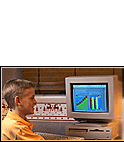 |
 |
Definitions and Description
The term Internet literacy is also known as digital literacy, electronic literacy, and information literacy. These terms focus on a new type of literacy which our students must learn in order to be productive citizens of the 21st century. Being literate no longer is limited to the ability to read and write. So what does it mean?
Yahooligans defines internet literacy as, “The ability to use the Internet to search for information, to find clues on web pages in order to evaluate the content, and to follow rules for gathering and presenting information.” (Yahooligans, 2002)
Paul Gilster, author of Digital Literacy, describes the term to Carolyn R. Pool, in a conversation for the journal, Educational Leadership. "Digital literacy is the ability to understand information and—more importantly—to evaluate and integrate information in multiple formats that the computer can deliver. Being able to evaluate and interpret information is critical. When I talk to teachers and librarians, I emphasize that you can't understand information you find on the Internet without evaluating its sources and placing it in context. (Pool, 1997)
This website was developed by Kathi
Trimble and Paula Sandridge as part of a course requirement for:
EDU: 510 Curriculum Trends and Issues
McDaniel College
August 2003